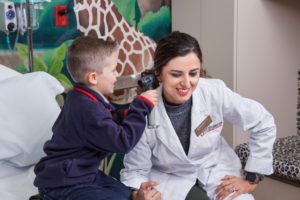
Q: How can I tell if my child is too sick to attend school?
“School districts have their own guidelines about when to keep a child home from school. You should always check with the school nurse or in the parent resource center of the school’s website for specific information. As an emergency physician, and a father, here are some general guidelines you can follow about when to keep a child home from school,” says Dr. Tim Laseter, and Emergency Physician at The Colony ER Hospital.
Fever. A raised temperature doesn’t always mean illness. If a temperature is low (under 100°) and your child is acting normally, it’s fine to send them to school. When a temperature is over 100° and your child is extra sleepy, complaining of pain, not eating or drinking well, or has had diarrhea, then they should be kept home from school.
Belly Pain. Non-specific belly pain can just be gas and may go away on its own. When pain is accompanied by diarrhea, nausea, and vomiting, then school is out of the question. For children under the age of five years old, it is even more important to keep them home and away from crowded places (not just school), because they’re more prone to accidents and improper hand washing. At any age, make sure the child is getting proper hydration (dehydration is the biggest risk of diarrhea and vomiting) and keep them out of school until all symptoms subside.
Runny Nose. Congestion, runny noses, and coughing are always tricky to decipher when determining when to keep a child home from school. If you know your kid has allergies and their sniffling and coughing are normal, then it’s fine to send them to school. If, however, the mucus is thick, green, or yellow, it’s best to keep them at home. Any time a running nose is accompanied by a sore throat or fever, the child should not attend school. Coughing is also an issue with younger children. Unless the child is taught to cover coughs (and sneezes), sending them to school only increases the risk of spreading infection. It’s very important to help children understand the significance of using a tissue, hand washing, and covering their mouths and nose with a tissue or their elbow when coughing or sneezing.
Lice or Ringworm. Because both head lice and ringworm are contagious, it’s best to keep a child at home until they clear up. Once lice are being treated, it’s okay to send a child back to school since the lice should be dying off. Instruct your child never to share hats, ball caps, combs, brushes, or hair accessories. Ringworm can be contagious if the affected area touches other skin. To be safe, even when treating, have your child wear clothes that cover the area to avoid spreading.
Dr. Laseter advises, “When in doubt about when to keep a child home from school, take your child to a doctor to be evaluated. When they are irritable, not eating normally, refusing liquids, complaining of pain and sleeping longer than usual, these are signs something may be wrong. go with your parental instincts. You know your child and their behavior better than anyone.”
 The Colony ER Hospital is a micro-hospital in The Colony, TX. They offer emergency medicine, and inpatient and outpatient medical services. They’re open 24/7 and emergency physicians are always on site. For medical imaging, such as CT scans, X-rays and ultrasounds, as well as lab tests, no appointment is necessary. They accept all major insurance plans.
The Colony ER Hospital is a micro-hospital in The Colony, TX. They offer emergency medicine, and inpatient and outpatient medical services. They’re open 24/7 and emergency physicians are always on site. For medical imaging, such as CT scans, X-rays and ultrasounds, as well as lab tests, no appointment is necessary. They accept all major insurance plans.
Check out The Colony ER Hospital online!
FACEBOOK :: TWITTER :: INSTAGRAM













